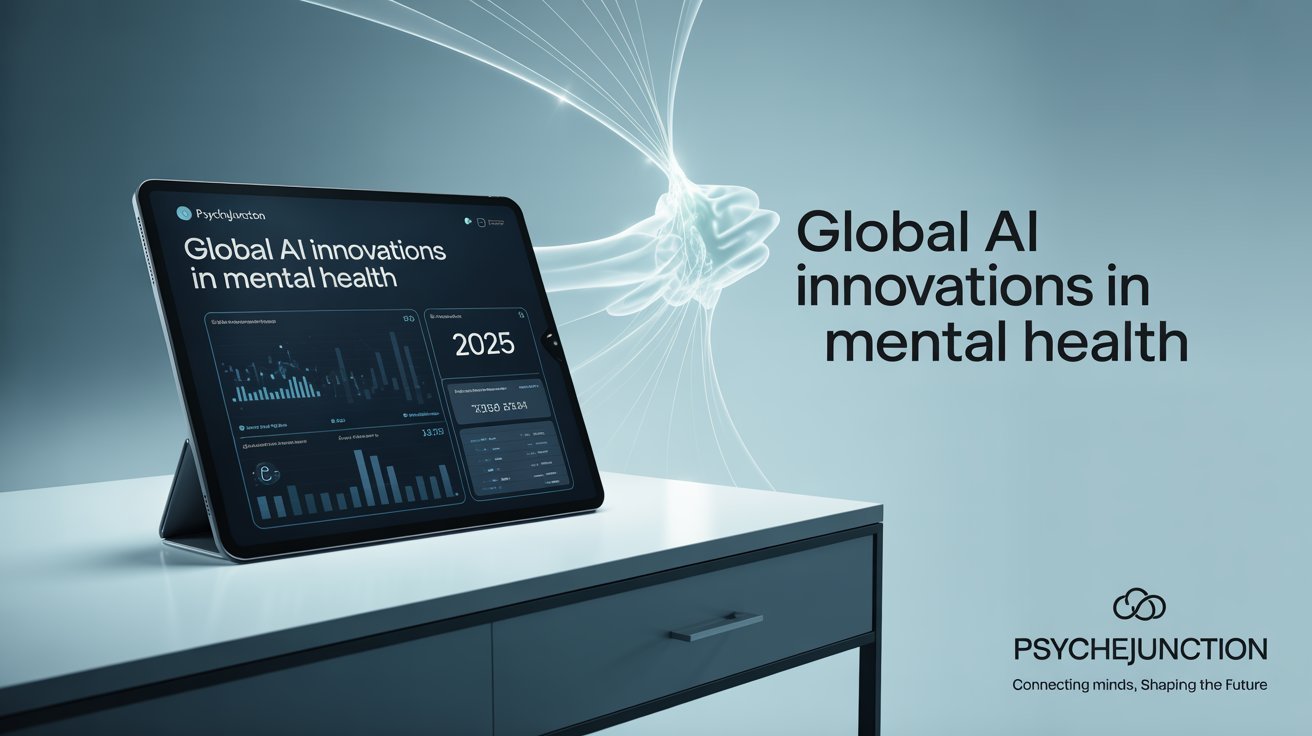Artificial Intelligence (AI) is rapidly transforming the landscape of mental healthcare, offering innovative solutions to enhance accessibility, personalize treatment, and support both individuals and healthcare providers. As we move through 2025, the momentum in AI-driven mental health initiatives continues to build, with companies worldwide launching and refining a diverse array of offerings. This report provides a concise overview of these global AI innovations.
The Booming Market of AI in Mental Health
The AI in mental health market is experiencing significant growth, reflecting increasing investment and adoption. Projections indicate a substantial expansion in the coming years. According to a report by Towards Healthcare, the market size is projected to grow from USD 1.45 billion in 2024 to USD 11.84 billion by 2034, exhibiting a compound annual growth rate (CAGR) of 24.15%. This growth is fueled by the potential of AI to address critical gaps in mental healthcare, including a shortage of professionals and the need for more accessible and continuous support.
Key Players and Their Pioneering Offerings
A diverse range of companies, from established tech giants to nimble startups, are at the forefront of AI-driven mental health solutions. Their offerings target various needs, from direct-to-consumer support to tools for clinical practitioners.
Established Platforms Evolving with AI
Several well-known mental wellness platforms are increasingly integrating sophisticated AI capabilities:
• Headspace (incorporating Ginger): Headspace has significantly enhanced its offerings with AI. Notably, they launched Ebb, an empathetic AI companion designed to help users navigate life's challenges. In May 2025, Headspace unveiled a new AI-powered stratified care model, leveraging conversational AI to evaluate member needs and guide them to appropriate levels of care, including EAP, coaching, therapy, and psychiatry services.
• Wysa: Wysa provides an AI-powered mental health chatbot offering 24/7 anonymous support and early intervention tools. The company is also focused on making its AI tools accessible in low-resource settings. A significant development in early 2025 was Wysa's acquisition of April Health, a virtual behavioral health provider, to expand its comprehensive care offerings.
• Youper: Youper positions itself as an Emotional Health Assistant, combining psychology and AI to engage users in natural conversations and help manage conditions like anxiety, depression, and sleep issues. It is trusted by over 3 million users and emphasizes safety and privacy in its AI design.
Specialized AI Solutions for Providers and Patients
Other companies are focusing on specific niches within the mental health ecosystem:
• Eleos Health: Eleos Health develops AI-powered, highly compliant documentation automation tools designed to ease the operational burden on behavioral healthcare providers. Their platform integrates with care operations, allowing clinicians more time for patient interaction. In January 2025, Eleos Health announced a $60 million Series C funding round, bringing its total raise to over $120 million.
• Woebot Health: Woebot Health has been a prominent name in chat-based AI wellness tools, aiming to make mental health support radically accessible. However, the company announced that its AI therapy app would shut down on June 30, 2025. This development highlights some of the challenges and complexities in delivering and sustaining AI mental health services.
Emerging Global Innovators
Innovation in AI mental health is a global phenomenon, with startups worldwide making significant contributions:
• O7 Therapy (Egypt): This company is developing an AI-driven platform to match patients with the most suitable therapists based on their specific needs and preferences.
• Callyope (France): Callyope is building speech-based foundational models to analyze patient behaviors and monitor symptoms across various mental health conditions through low-touch smartphone interactions.
• Thalia Psychotherapy (Kenya): Focusing on the African continent, Thalia Psychotherapy is developing AI-powered tools to assist therapists in analyzing patient conversations and identifying potential mental health issues.
• Bamboo Technology (HereHear Virtual AI Therapist): Based in Berkeley, California, Bamboo Technology's HereHear app offers a virtual AI therapist featuring sophisticated vocal and emotional analysis, analyzing voice features in seconds to detect emotional states.
Key AI Applications and Technological Advancements
The innovations from these companies highlight several key applications of AI in mental health:
- AI Chatbots and Virtual Companions: Providing on-demand emotional support, psychoeducation, and guided exercises
- AI-assisted Diagnostics and Symptom Monitoring: Utilizing AI to analyze text, speech, and behavioral data to help identify early signs of mental health conditions
- Personalized Treatment Plans and Support: Tailoring interventions and support based on individual user data and needs
- Administrative Automation for Clinicians: Reducing the burden of documentation and other administrative tasks, allowing providers to focus more on patient care
Challenges and the Path Forward
Despite the promising advancements, the field of AI in mental health faces several challenges. These include ensuring data privacy and security, addressing ethical concerns regarding AI's role in sensitive healthcare decisions, and navigating a complex regulatory landscape. The quality and efficacy of AI tools must be rigorously validated to ensure they are safe and beneficial.
There is also growing concern about the responsible development of AI tools, particularly for vulnerable populations. The American Psychological Association (APA) has met with federal regulators over concerns that some AI chatbots posing as therapists could endanger the public. A recent health advisory highlighted the need for AI developers to build in features to protect the mental health of young people.
The path forward requires a commitment to responsible innovation, transparency in how AI models work, robust clinical validation, and a focus on augmenting, rather than replacing, human connection in mental healthcare.
Professional Perspective: Implications for Psychology Practice
As a clinical psychologist, I observe that these AI innovations present both tremendous opportunities and important considerations for our field. While AI tools can enhance accessibility and provide valuable support between sessions, they cannot replace the nuanced understanding, empathy, and therapeutic relationship that human clinicians provide.
The key is integration rather than replacement - using AI to enhance our clinical capabilities while maintaining the human elements that are essential to effective mental health treatment.
Conclusion
AI holds immense potential to revolutionize mental health care by making support more accessible, personalized, and efficient. As of 2025, companies globally are actively developing and deploying a wide range of AI-based offerings, from sophisticated chatbots and diagnostic aids to administrative tools for clinicians.
While the market is booming and innovation is rapid, it is crucial to navigate the associated challenges with a strong ethical framework and a commitment to user well-being. The ongoing evolution of AI in this sensitive field promises further transformative changes, hopefully leading to improved mental health outcomes for millions worldwide.
For free report, please drop us an email on support@psychejunction.com
#AImentalhealth #PsychologyTech #MentalHealthInnovation #DigitalTherapy #PsycheJunction



